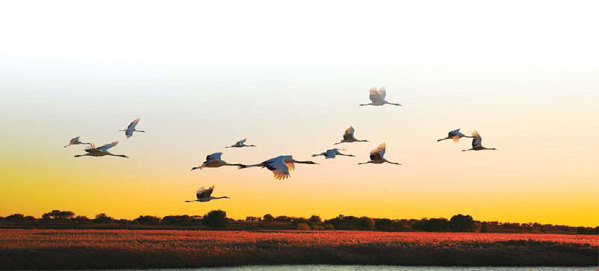Nature, culture are a winning mix in Jilin
Province wows travelers with its charming mountains, wetlands, forests and historical locales
The breezy forests of Northern China's Jilin province, which remains colder than other parts of the country year round, provide a refreshing change of pace from hot, crowded beach resorts and other places that might come to mind when one usually thinks of summertime travel destinations.
The province borders North Korea and Russia to the east, Heilongjiang province to the north, Liaoning province to the south and Inner Mongolia to the west. Its name literally meaning "riverside city", the area has been inhabited by various people throughout history, such as the Xianbei, Koreans, the Mohe, the Wuji, the Manchu and the Han.
Visitors to Jilin should take every opportunity to experience its amazing natural scenery, especially the forests. The Changbai Mountains, which include a young dormant volcano lake called Tianchi, are often the first destination many tourists flock to upon arriving in the province.
The area can be easied reached by train, by car, by bus or by airplane.
The Changbai Mountains run through its southeastern regions and contain Baiyun Peak, the highest point in the province, at nearly 2,700 meters.
The mountains, which contain the highest point in Northeast China, has a long and extremely cold winter due to its latitude and altitude. "Changbai" means "always white" in Chinese, referring to the perennially snow-capped status of this lofty peak.
There is a saying about Changbai Mountains that "one can reach the North Pole in half a day" there because the mountains feature types of vegetation common to Arctic regions, including hardwood and coniferous forests as well as Alpine tundra.
To enjoy beautiful morning scenes in the mountains, visitors should get up at around 5 am.
The renowned Changbai Hot Springs are about 1,000 square meters and include more than 30 individual springs. The spring water is about 83 C all year round.
One highlight of a trip to the springs is that one can boil an egg in them. After boiling for 20 minutes, the egg will come out tasting especially delicious thanks to the various natural minerals in the water.
If you want to taste them without spending the time to boil them yourself, there are nearby food stands where ready-made eggs are sold at the price of two yuan ($ 0.31) for three eggs.
Atop the 2,194 m main peak of Changbai lies the Tianchi Lake, a volcanic lake said to have a depth of 373 m, making it arguably the country's deepest lake. It is rumored that huge unknown creatures or "lake monsters" have been spotted in the lake several times and a "lake monster observation station" has been built along the lake in the hope of solving the mystery.
The Changbai Mountains were listed as one of UNESCO's international biological protection zones in 1980 and became the country's primary scenic spot in 2007.
Amazing wetland
Another must-see place is Jilin's wetlands. The Xianghai wetlands lie along the Songliao Plain and the eastern frontier of Horqin Grassland.
The wetland, which is about 106,700 hectares, is hailed as "the lung of the earth". This is one of the best places to see wetland flora and fauna, such as reed marshes, various kinds of birds and apricot forests. You can also see locals fishing and raising cattle.
With a total of 258 varieties of birds, Xianghai is a paradise for birdwatchers, who can see some of the rarest birds on the planet here. More than 60 of the 1,500 remaining red-crowned cranes left in the world reside in the wetlands.
There are also more than 30 other types of exotic animals living here, including roe deer, Mongolian gazelles, foxes, badgers, yellow weasels and so on.
The wetland is now listed as a national forest and a wild animal nature reserve.
Fangchuan scenic zone
After a wild tour through breathtaking scenery, it is a good time to visit another of the province's natural treasures - the Fangchuan National Scenic Zone in the southern part of Hunchun city. Standing on the mountains of the Fangchuan scenic zone, tourists can have an unparalleled view of the border areas of Russia and North Korea.
A national forest park, Fangchuan Park is home to a number of rare plants, animals and birds. The park is also the core area of the Protection Zone for the Far East Leopard.
Hunchun, where the Fangchuan scenic zone is located, is the only Chinese city that borders both Russia and North Korea.
Located in the lower reaches of the Tumen River in southeastern Jilin, Hunchun has become an important and emerging border city.
It is now established as a key center for the promotion of border trade as well as business and cultural exchanges. It serves as a bridge between China and a number of other countries in Northeast Asia, including Russia, Japan and North Korea.
Sailing along the Tumen River, once dubbed the "Silk Road of the Sea", for 15 km from Fangchuan brings you into the Japanese Sea.
Contact the writer at liumingtai@chinadaily.com.cn
|
Red-crowned cranes fly over the wetlands of Xianghai, home to more than 258 types of birds. Photo provided to China Daily |



















